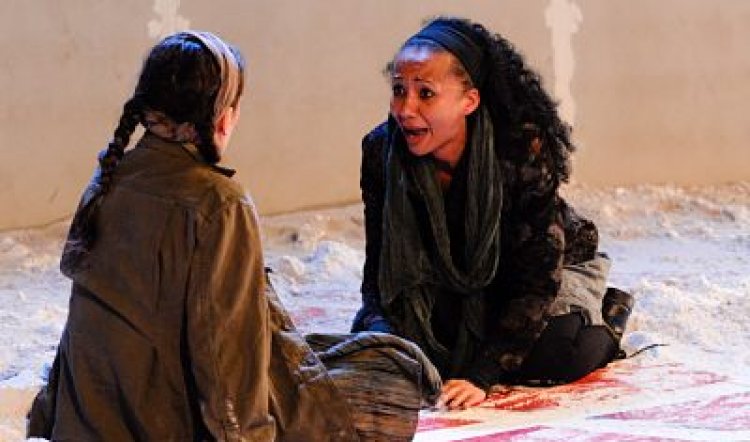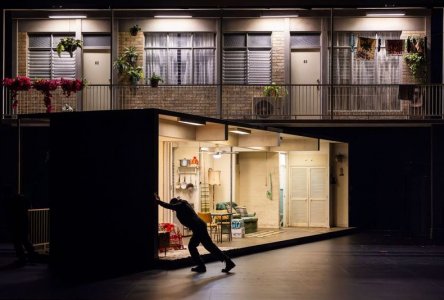
Scorched
Scorched, Belvoir Street Theatre July 19-September 7, 2008; phone: 02 9699 3444 or www.belvoir.com.au
WHEN Wajdi Mouawad was six years old he saw Christian militiamen machine-gun a bus full of Palestinians in the Beirut suburb of Ain al-Rummaneh. Twenty seven passengers were killed in retaliation for the death, hours earlier, of a Christian. Thus began the civil war. For Mouawad it was also the beginning of an accumulation of memories and events which finally emerged in 2003 as the play Scorched.
The word “Lebanon” is never mentioned in the play but it is clear that it takes place there before, during and after that civil war. It spans half a century and the lives of three women: Nazira (Gillian Jones), her daughter Jihane (Paul Arundell) and Jihane’s daughter Nawal (Zindzi Okenyo). Like so many such conflicts and uncivil upheavals, however, it could have taken place anywhere; and still is taking place in various parts of the world.
Scorched begins with Nawal’s death and the reading of the will to her adult children, twins Simon (Ashley Lyons) and Janine (Yael Stone), by their mother’s “friend and notary” Alphonse Lebel (Brian Lipson). To the twins – mathematician Janine and amateur boxer-jock Simon – brought up in a peaceful country a world away from their mother’s origins, the terms of the will are at once enfuriating and unfathomable. The will also delivers a life-changing shock of revelation and offers them a challenging quest, back to the old country.
The contrast between the twins is extreme: Janine is a self-contained cerebral creature whose emotions are governed by the symmetry and solace of maths. Simon is his own emotional punching bag and his resentment and anger at his dead mother threaten to boil over at the slightest provocation.
Alphonse Lebel, myopic, pompous and eccentric to the point of caricature (unless you’ve met someone like him) is provocation enough but for Simon, his mother’s withdrawal and profound silence over a number of years has been enough to tip his fragile fatherless then motherless self into a freefall of confidence. Meanwhile, having habitually lost herself in equations and theorems, Janine finds herself intrigued by the mystery of the will: who was their father? Where did their mother come from? What is the meaning of the tattered denim jacket she left to Janine? Who are the echoes, ghosts, songs and phrases that come out of the dark place of Nawal’s memory?
Wajdi Mouawad was born in Lebanon then lived in Paris for a few years before emigrating with his family to Quebec. Now aged 40, he has been artistic director of French Theatre at the National Arts Centre in Ottawa since 2007. His work has been staged in France but, to this point, he is not much known outside Canada. This is the first production of his work in Australia.
Scorched was originally written in French and its rhythms and verbal idiosyncrasies make more sense to the Aussie ear once you know that. Nevertheless, the power of the storytelling is heightened by language that is audibly and stylistically French and Middle Eastern in its poetic qualities, with passages of repetition and plays with/on words and a lyrical flow and boldness that becomes captivating.
Although totally different in other ways, the inexorable slow-moving river quality of the narrative is reminiscent of Ten Canoes. In the movie Gulpilil grinned out of the screen and said something like, “I know you want me to get on with the story, but this is my story and if I want to go off a bit and tell you this other bit, you just have to go with me.”

Similarly Scorched sets its own language, rules, agenda and pace right from the start and giving yourself up to it is to experience a thrilling and absorbing work of theatre and imagination. The events and characters are both fictionalised and true. Similar people lived and died, loved and lost; similar situations threw them into chaos and misery or halfway around the world. Many Australians would understand the underlying hopes and fears only too well.
The play sets traps for those who would judge hasilty or with absolute certainty. It illustrates that “ordinary” people can do extraordinary things, given the opportunity or sufficient threat. And those things might be heartstoppingly good and kind or life-extinguishingly vicious and terrible. None of us are immune from any of it, as victim or perpetrator. And some of the greatest crimes are committed, wittingly or otherwise, within families and by “nice” people.
Scorched is a three-hour (with interval) exploration of recent history, current events, family dynamics and the close relationship between love and hate; and finally, the powerfully sweet balm of understanding and forgiveness.
The performances of the ensemble cast of ten are strong and multi-faceted, their characters are clearly delineated although telling which Nawal is which (older, younger) is tricky at times. To expand any more on who’s who would be to risk revealing too much of the outcome and that would be unforgivable.
Like the play itself the white sand set covers much and slowly reveals a little, bit by bit. The music and sound design are tremendous and the costumes and lighting likewise. Scorched is not an easy play, but it is immensely rewarding if you like your stories rich and raw. For such an undertaking the exigencies of less than four weeks rehearsal time showed on opening night in ragged edges and some ratty timing, but in a few days, as the wheels are oiled and the cogs mesh in Neil Armfield’s beautifully nuanced production, it must achieve its potential.*
* Word from Belvoir is that the notes were misleading, the play had five weeks rehearsal and 10 days in the theatre; nevertheless, it's a tight schedule for such a complex play and illustrates the financial constraints of even our most successful companies.
Scorched by Wajdi Mouawad, translated by Linda Gaboriau; directed by Neil Armfield, assistant director Wayne Blair, set design Stephen Curtis, costume design Anna Borghesi, lighting design Nigel Levings; composers Alan John and Carl Dewhurst (onstage live musician); sound design Steve Toulmin. Cast: Paula Arundell, Carl Dewhurst, Adam Hatz, Gillian Jones, Brian Lipson, Ashley Lyons, Lucia Mastrantone, Zindzi Okenyo, Hazem Shammas, George Spartels and Yael Stone.



